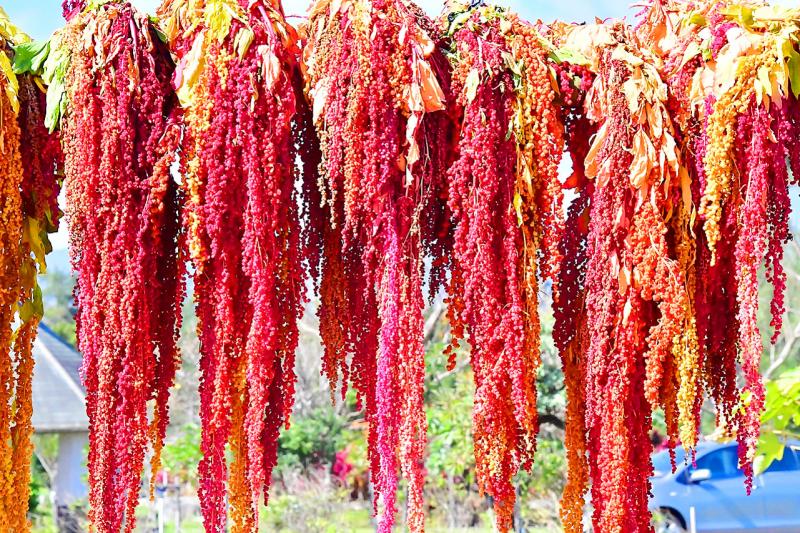Taiwan is to send plant seeds to outer space for the first time in October to observe how the space environment affects their genetic makeup, the National Space Organization (NSPO) said yesterday.
The Space Seeds for Asian Future program is being developed by the Japan Aerospace Exploration Agency. Nine nations, including Taiwan, are participating in the program this year, with 16 kinds of seeds expected to be sent to the International Space Station (ISS), where they would stay for about four months, the NSPO said.
Participating nations have primarily chosen the seeds of endemic plants or plants with symbolic meaning, it said, adding that some are crop seeds.

Photo: Chen Hsien-i, Taipei Times
The NSPO collaborated with National Chung Hsing University’s College of Agriculture and Natural Resources and the Taiwan Agricultural Research Institute, which is overseen by the Council of Agriculture, to choose which seeds to send, it said.
The college has chosen the seeds of Formosa lambsquarters, Phalaenopsis equestris, which is a kind of “butterfly orchid” originating from Lesser Orchid Island (小蘭嶼), and sunflowers, while the institute has picked chili pepper seeds, the NSPO said.
The seeds to be sent to the ISS weigh 10g, 1g, 20g and 16g respectively, it added.
The seeds selected by the university have arrived in Japan and are expected to be sent to the US next month, the NSPO said, adding that they would be returned to Taiwan in February next year.
The university is to plant the seeds following their return and observe how factors such as microgravity and space radiation affect their growth, it said.
Experts chose which seeds to send following multiple meetings with academics specializing in plants after assessing factors such as contribution to teaching and research, and weight limits for space travel, college dean Chan Fu-chih (詹富智) said.
As Japan and the US have different regulations regarding the importation of seeds, lengthy preparations had to be made, such as filling out forms on the quarantine of imported and exported seeds, as well as advance virus tests on them, Chan said.
Formosa lambsquarters, also endemic to Taiwan, is a traditional crop grown by Aborigines, but little research has been dedicated to it, while sunflower is a common plant, making it a convenient target for observation and research, she said.
Thailand and Australia have picked the seeds of their national flowers, the ratchaphruek and the golden wattle respectively; New Zealand is sending the seeds of the pohutukawa, an endemic plant; Indonesia is sending celery and onion seeds; and Malaysia the seed of holy basil, the NSPO said.

ACTION PLAN: Taiwan would expand procurement from the US and encourage more companies to invest in the US to deepen bilateral cooperation, Lai said The government would not impose reciprocal tariffs in retaliation against US levies, President William Lai (賴清德) said yesterday, as he announced five strategies to address the issue, including pledging to increase Taiwanese companies’ investments in the US. Lai has in the past few days met with administrative and national security officials, as well as representatives from various industries, to explore countermeasures after US President Donald Trump on Wednesday last week announced a 32 percent duty on Taiwanese imports. In a video released yesterday evening, Lai said that Taiwan would not retaliate against the US with higher tariffs and Taiwanese companies’ commitments to

‘SPECIAL CHANNEL’: Taipei’s most important tasks are to stabilize industries affected by Trump’s trade tariffs and keep negotiations with Washington open, a source said National Security Council Secretary-General Joseph Wu (吳釗燮) arrived in the US for talks with US President Donald Trump’s administration, a source familiar with the matter said on Friday. Wu was leading a delegation for a meeting known as the “special channel,” the Financial Times reported earlier. It marked Trump’s first use of the channel since returning to the White House on Jan. 20. Citing a source familiar with the matter, the Financial Times reported that Minister of Foreign Affairs Lin Chia-lung (林佳龍) was also a part of the delegation. The visit came days after China concluded war games around Taiwan and amid Trump’s

CHIP EXCEPTION: An official said that an exception for Taiwanese semiconductors would have a limited effect, as most are packaged in third nations before being sold The Executive Yuan yesterday decried US President Donald Trump’s 32 percent tariff on Taiwanese goods announced hours earlier as “unfair,” saying it would lodge a representation with Washington. The Cabinet in a statement described the pledged US tariffs, expected to take effect on Wednesday next week, as “deeply unreasonable” and “highly regrettable.” Cabinet spokeswoman Michelle Lee (李慧芝) said that the government would “lodge a solemn representation” with the US Trade Representative and continue negotiating with Washington to “ensure the interests of our nation and industries.” Trump at a news conference in Washington on Wednesday announced a 10 percent baseline tariff on most goods

HELPING HAND: The steering committee of the National Stabilization Fund is expected to hold a meeting to discuss how and when to utilize the fund to help buffer the sell-off The TAIEX plunged 2,065.87 points, or 9.7 percent, to close at 19,232.35 yesterday, the highest single-day percentage loss on record, as investors braced for US President Donald Trump’s tariffs after an extended holiday weekend. Amid the pessimistic atmosphere, 945 listed companies led by large-cap stocks — including Taiwan Semiconductor Manufacturing Co (TSMC, 台積電), Hon Hai Precision Industry Co (鴻海精密) and Largan Precision Co (大立光) — fell by the daily maximum of 10 percent at the close, Taiwan Stock Exchange data showed. The number of listed companies ending limit-down set a new record, the exchange said. The TAIEX plunged by daily maxiumu in just